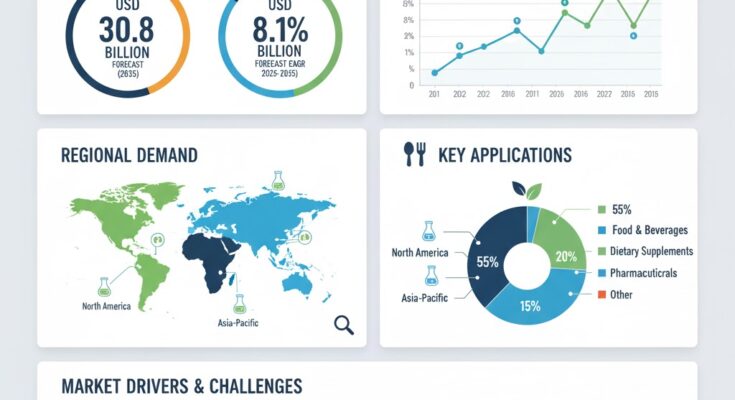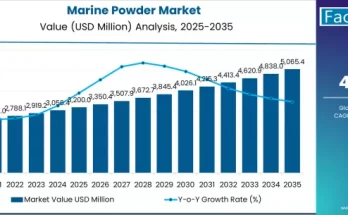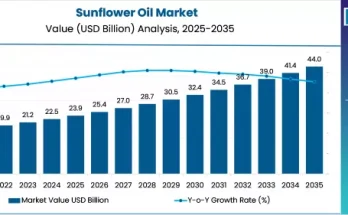The global sweet protein extracts market is poised for remarkable expansion as food and beverage manufacturers increasingly shift toward natural, low-calorie sweeteners to meet evolving consumer preferences and stringent regulatory standards. According to a recent report by Fact.MR, the market is projected to grow from USD 14.1 million in 2025 to approximately USD 30.8 million by 2035, recording an absolute increase of USD 16.7 million over the forecast period. This reflects a compound annual growth rate (CAGR) of 8.1% between 2025 and 2035.
The demand surge for sweet protein extracts is primarily driven by rising global health awareness, the push for reduced sugar consumption, and advancements in natural ingredient extraction technologies. As consumers increasingly reject artificial sweeteners and high-sugar formulations, food and beverage producers are turning to sustainable, plant-based proteins like thaumatin, brazzein, monellin, and curculin—known for their intense sweetness and zero-calorie benefits.
Strategic Market Drivers:
Rising Demand for Natural Sweeteners and Clean-Label Products
The global movement toward healthier and cleaner food labels has accelerated the use of natural sweeteners derived from plants and fruits. Sweet proteins offer a unique advantage they are several thousand times sweeter than sucrose but contain negligible calories, making them ideal for diabetic-friendly and low-glycemic food applications. Consumers’ growing distrust of synthetic additives has further strengthened this shift toward protein-based sweeteners.
Technological Innovations in Protein Extraction and Fermentation
Advancements in biotechnology, such as precision fermentation and enzymatic synthesis, have significantly improved the scalability and cost-effectiveness of sweet protein extraction. Companies are employing sustainable extraction methods and bioengineering to replicate rare proteins like brazzein and monellin without depending solely on wild plant sources, thereby ensuring consistent quality and supply.
Expanding Applications Across Food & Beverage Segments
Sweet protein extracts are finding widespread applications in beverages, dairy alternatives, confectionery, and bakery products. They are also increasingly used in sports nutrition, functional foods, and dietary supplements, thanks to their clean-taste profile and compatibility with other natural ingredients. The beverage industry, in particular, is emerging as the most lucrative segment as global brands reformulate drinks to reduce sugar without compromising flavor.
Supportive Regulatory Environment and Health Initiatives
Government-led campaigns to reduce sugar intake and combat obesity have accelerated market adoption. Regulatory agencies such as the FDA and EFSA are supporting the approval and commercialization of protein-based sweeteners due to their safety and natural origin. This regulatory backing has opened new opportunities for global brands to innovate with healthier alternatives.
Regional Growth Highlights
North America: Leading in Innovation and Consumer Adoption
North America remains a frontrunner, accounting for a significant share of global demand. Rising health consciousness, strong R&D infrastructure, and early regulatory approvals have encouraged large-scale adoption of sweet protein extracts in the U.S. and Canada. The region’s thriving functional beverage market further accelerates product penetration.
Europe: Regulation and Sustainability Drive Market Expansion
Europe’s stringent sugar taxation policies and high consumer preference for sustainable food ingredients are propelling growth. Countries such as the U.K., Germany, and France are witnessing rapid integration of sweet proteins in both retail and industrial food formulations. Moreover, European companies are focusing on carbon-neutral extraction processes to meet environmental commitments.
East Asia: Rapid Commercialization and Local Production
East Asia is emerging as a key growth hub due to expanding nutraceutical and beverage industries. Japan, South Korea, and China are investing heavily in fermentation-based protein production, supported by domestic consumer demand for low-sugar foods and natural sweeteners.
Emerging Markets: Latin America and Middle East
Emerging economies in Latin America and the Middle East are gradually adopting sweet protein extracts, driven by increasing health awareness, rising disposable incomes, and government-led wellness initiatives. Local manufacturers are collaborating with international suppliers to introduce cost-effective formulations.
Market Segmentation Insights
By Source
Sweet proteins such as thaumatin, brazzein, monellin, and curculin dominate the market, each offering unique sweetness profiles and thermal stability. Thaumatin currently holds the largest share, favored for its wide application in flavor masking and beverage sweetening.
By Application
- Food & Beverages: Dominant segment, especially in soft drinks, yogurt, and confectionery.
- Nutraceuticals & Dietary Supplements: Increasing adoption due to clean-label trends.
- Pharmaceuticals: Emerging use as taste modifiers in oral medicines.
By Form
Powdered extracts remain the preferred form due to ease of handling, stability, and longer shelf life. However, liquid formulations are gaining traction in beverage and syrup applications for faster solubility.
Challenges and Market Considerations
Despite robust growth prospects, several challenges persist in the sweet protein extracts market:
- High Production Costs: Advanced extraction and fermentation techniques require significant capital investment.
- Limited Consumer Awareness: Awareness about sweet proteins remains lower compared to stevia or monk fruit sweeteners.
- Regulatory Delays: Varying regional approval processes can slow product commercialization.
- Formulation Challenges: Compatibility with other ingredients and stability in heat-processed foods require further research.
Competitive Landscape
The global market is characterized by strategic partnerships, R&D collaborations, and biotechnological innovations. Major players are investing in scalable production methods and exploring hybrid sweetener formulations to meet evolving taste and cost demands.
Key Players in the Sweet Protein Extracts Market:
- Cargill
- DuPont
- Archer Daniels Midland (ADM)
- Tate & Lyle
- PureCircle
- Ingredion
- Glanbia
- SweetLeaf Stevia
- Herboveda India
These companies are focusing on expanding production capacity, developing precision fermentation solutions, and securing regulatory approvals in emerging regions. Strategic alliances with beverage and food manufacturers are also strengthening their global footprint.
Future Outlook: Toward a Natural, Health-Driven Sweetener Revolution
The next decade marks a transformative era for the sweet protein extracts market. As consumers demand natural, low-calorie, and sustainable sweeteners, manufacturers that combine innovation with affordability will capture significant market share.
With the convergence of biotechnology, sustainability, and wellness trends, sweet protein extracts are positioned to redefine the global sweetener landscape—offering a clean, safe, and delicious solution for the food and beverage industry of the future.
Companies like Cargill, ADM, and DuPont are leading this shift through precision fermentation and scalable production, paving the way toward a healthier, more sustainable global diet.



